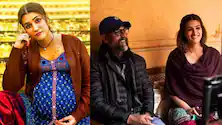EXCLUSIVE INTERVIEW! Laxman Utekar: No Industry Will Survive Without Stardom
"An intelligent actor doesn't only understand his character, he/she also understands the film," director Laxman Utekar tells me as he decodes the success of his last directorial, Kriti Sanon-starrer Mimi, which won big at the recently held IIFA Awards 2022.
From impressing us with his frames in films like English Vinglish, Dear Zindagi and Hindi Medium, to donning the director's hat for Kartik Aaryan's Luka Chuppi and Kriti's Mimi, Utekar's journey in the Hindi Film Industry has been a fascinating one.
In an exclusive 'no holds barred' interview with Filmibeat, the filmmaker talks about the north-south debate, the trend of remakes, Mimi's win at IIFA awards, directing a larger than life biopic on a warrior and much more.
Excerpts from the conversation...

'Unless We Don't Have More Stars, Actors & New Talents, The Established Stars Will Continue To Charge Big Amount'
Q. In the last few months, there has been a lot of chatter around the fee hike when it comes to actors especially in times of pandemic. In fact, Bhushan Kumar said that people today want to see larger than life cinema and you need to put big money to make those films. He added that such films can be made only with the support of actors. There are times when the producers have to cut down the budget because the actors charge a hefty fee. As somebody who is venturing into production now, how do you look at this scenario?
A. To be very frank, I feel the audience is educated now and more than larger than life cinema, I would say that they want to watch good cinema. It doesn't matter whether it's visually, emotionally, content or depth-wise larger than life. It's not only about the visuals or the scale. It's not only about putting lots of money and creating big visuals. It's all about if you are making good cinema. If the audience is getting entertained by your cinema, they are going to watch it. Ever since the theatres have re-opened, tell me one film which was good but didn't work at the box office. The audience rejected those movies because they didn't like them and those films weren't good. If we look at the current scenario around us, everyone is clueless about what's happening. When the audience visits the theatres, they want to laugh and cry. The minute they see something flat on the screen, they get busy on their phones. So, they are very restless and you have to keep them engaged whether it's with the big scale cinema or emotional stuff or content-driven films. If you make good cinema and good films, they will watch it.
Q. But then, do you think actors need to charge their fee as per the films?
A. Actually that's a dicey question (laughs). Most of the superstars, I won't name them, own production houses and they star in the films produced by them. So, they have to incur both the profits as well as the loss. Woh kitna charge karte hai woh sirf naam ke liye hain. But whatever films they do, their production house is involved in some way or the other. Ultimately, the film is theirs.
When we speak in terms of stardom, then I feel the stars themselves should think whether their film's opening is justifying their hefty fee. They should be responsible for that. For example, if the producer is paying Rs 100 Crore, is their film's opening or the opening weekend worth that amount? But, most of the stars have their own production houses and they make and act in films under their own banner. So, they are responsible for the loss or the profit.
Q. Some time back, Karan Johar had also said that he is baffled with young actors who are yet to prove their muscle at the box office asking for a remuneration of Rs 20-30 Crore. He had called it a dangerous trend...
A. Karan sir said that very rightly. But then, why don't we go out and find more talent? In a country with a population of 140 Crore which has some of the top talents from different industries, why don't we go out, take auditions and discover new faces? There are established production houses that can do that. In today's times in our industry, we have four superstars, four stars and rest are actors. But, we are making a lot of films. So, the actors know that there is a lot of work out there and they are few in numbers. So obviously, they will quote higher prices because they are in demand. They get two scripts to read daily and the producers are waiting for their calls. So, they will quote big amounts. But at the same time, if we have more actors or stars, the remuneration will fall. But then we don't go out to find talent. In fact, it's a tough job. I produced Ittu Si Baat with new faces. But then, to promote the films with new faces, it's not only the producers, even the media.
When stars visit television shows to promote their films, they don't promote the films; instead they promote the TV show. The television shows don't allow new faces. So, it's a chain. Nobody is taking actual efforts to launch new talent otherwise our country is full of new talent. Nobody is taking that effort because maybe they have a lot of problems in terms of promoting their films and getting screens. But there are big production houses in our country who can afford to do it.
Unless we don't have more stars, actors and new talents, established actors are going to charge big amount. That's for sure, because they know the demand is more while the supply is less.
Q. 2022 hasn't been a great year for the Hindi Film Industry. Some films featuring stars have not worked at the box office. Now, the audience is ready to watch content irrespective of the language. The audience believes that if the content is worth the ticket's price, they will go and watch it. In the post-COVID-19 era, do you believe the filmmakers will also have to adapt with the times? The stories have become more medium-specific.
A. Of course, the filmmakers will have to adapt with time. I feel the audience's taste changes in every five years. If you look at cinema from the 70s, 80s and 90s, they all had their own distinct flavours. Like I said before, you are dealing with an educated audience and you cannot fool them. They are watching world cinema on their phones. They know about the technology and everything else. So, a producer should be aware about the kind of content that needs to be made for OTT and the big screens (theatres).
In our country, theatres have always targeted at middle-class families. For them, it's like a celebration. So, they don't want to watch films that have depth or are meaningful on the big screen. They would rather watch it on the laptop.
Q. In recent times, there has been a certain sense of negativity around the Hindi Film Industry which has trickled into social media. Further, there are constant comparisons between Bollywood movies and films from the South. Do you think that's justified?
A. I don't think that's justified because Bollywood has given many hit films and masterpieces. Jo mahol beech mein chal raha thha, aisi lag raha thha jaise negativity phaila di jaa rahi hain...We were making many big films featuring big stars. So, it's always these big stars who open the doors of the theatres. Films like KGF: Chapter 2 and RRR led to the opening of the doors of the cinema halls. The audience loved those films because they were entertaining. These movies didn't have a single frame where they were bored. I believe that the differentiation between different industries which will soon vanish. There will be no Bollywood or Tollywood. It's going to be only Indian cinema and that's how it should be. See, there are bad films even in the South industry. But, we only discuss the good films. The same holds true for Bollywood as well.
For example, if we make ten films here, there might be only two good films amongst them. But because we belong to the Hindi Film Industry, we also discuss about those eight bad films and do comparisons with the movies from South (laughs). It doesn't work like that.

'Pulling Off A Remake Is Riskier Now'
Q. Remakes have always been in vogue. In fact, you adapted the Marathi film Mala Aai Vahhaychyi as Mimi with Kriti Sanon. Now if you look at the upcoming slate of films, there are remakes of many regional films in the pipeline. Do you feel pulling off a remake in today's times is even more riskier because the original film is easily available on OTT platforms and a section of audience might have already watched it online?
A. Pulling off a remake is riskier now. Obviously, as a filmmaker, you will try to remake a film which is already successful in the original language. That hit film might already be available on a streaming platform and many people would have already seen it. If that's the case, then why would people watch a remake of that film?
That's what happened with Jersey (Shahid Kapoor's film). It was a good film but maximum people had already watched the South version. I think remakes are passe. Now, the audience wants to watch fresh content.

'Kriti Sanon Deserves All The Awards For Her Performance And Hard Work In Mimi'
Q. Speaking about Mimi, the film picked up two awards at IIFA this year. Kriti Sanon bagged the trophy for Best Actress while Sai Tamhankar picked up the Best Supporting Actress award. How does it feel when your work gets that validation?
A. I feel good about it. More than awards, I would say Mimi was the first OTT film which proved that movies can work on digital platform as well. Shershaah happened after that. In fact, when we were shooting for Mimi, I had already told Kriti and Sai that they would be walking away with awards for their good performances. I don't think any actress beat Kriti's performance that year. Honestly, I feel she deserves all the awards for her performance and hard work.
When Mimi released, it received a lot of appreciation from all nooks and corners. A lot of people texted me and called me up saying that they enjoyed watching the film at home with their family. For me, that's more important than any other award.

'I Don't Feel The Need To Have All The Credits'
Q. Santosh Sivan once said that being a cinematographer is more like a Zen-kind of a job. You go, you look at your lighting, you don't have to interact with people, instead you interact with nature. On the other hand, when you are directing, it's all about managing people and lot of other things. I have observed that the films that you have directed so far, right from Tapaal to Mimi, you have always got somebody else on board to do the cinematography. Is that a conscious decision that you make?
A. It is a conscious decision. I have been a cinematographer for many years. I have shot for more than 14-15 movies. Now, I am into direction and want to tell my own stories. Also, I don't feel the need to have all the credits. I want to rather focus on my storytelling and direction. A director is not a person who only directs the actor. He directs each and every one on the sets. So, there is actually lots to do.
I consciously hire a cinematographer for my films and if you notice, my every film has a debutant cinematographer. I believe that after doing so many films, it's my responsibility to give breaks to new talents when I am directing a film. If something goes wrong, I know that department as well. So, I can fix it.
Q. But when you are writing a film, you also imagine it in terms of visuals. At the same time, the DoP will also have his interpretation. So, how do you manage to find that middle ground?
A. Actually, it doesn't happen that way. For example, when I shot for Gauri Shinde for English Vinglish and Dear Zindagi, we never had different visualization for the same script. It never happened like that. It's always the director's vision because he or she is the person who knows in and out of the script, and knows each and every emotion. Once as a director, you are sure in your mind that this is the world that I am going to translate, you explain your DoP what you are looking for in terms of the colour palette, structure and the feel.
The DoP's job is to enhance your vision. His job isn't to come up with a different vision. So, I have never had such clashes because I translate what I have in my head to my DoP who in turn, enhances my thoughts.

'The Biggest Drawback Of Marathi Industry Is The Lack Of Stars'
Q. You started your directorial journey with a Marathi film, Tapaal followed by Lalbaugchi Rani. Both films received critical acclaim. Speaking about Marathi cinema, it still has a long way to go in terms of buzz when compared to the South Industry in spite of the fact that there's no dearth of talent.
A. If you look at some of the Marathi films, they all have one-time producers. Some of them produce one film never to return back. I would say, the Marathi industry has good directors and good story-tellers but they lack makers. A maker is essential for any industry. For example, we have Dharma Productions, Yash Raj Productions, Maddock Films and others in Bollywood.
It's surprising that the studio system started with the Marathi Film Industry. We had V Shantaram Studio, Prabhat Studio. But now, everything has vanished. Forget about the studios, there are no fixed or permanent producers who are passionate about producing films. They just produce films because they want to see their name on the hoarding and click pictures with heroes and heroines. There are very few producers who passionately produce films. Also, there are no buyers. There are many people who try to make good films but there are hardly one or two channels to buy those films. If your film isn't doing well at the box office and you want to sell it, they offer you peanuts because the producers have no other way to go. So obviously, it's the loss of the producer so why would he bankroll the film? The biggest drawback in Marathi industry is the lack of young stars. Most of the stars or so-called actors who call themselves stars, are above 45-50 years old. They are not in their shape. Woh din mein picture mein dikhte hain, shaam ko TV serials mein dikhte hai aur dopahar ko aap unhe plays mein bhi dekh rahe ho. They are everywhere. So, the biggest drawback in Marathi industry is the lack of stardom and without stardom, no industry is going to survive.
Every time you cannot blame the distributors or exhibitors. At the end of the day, it's business. The creation is a different game altogether and the distribution is a different game.
Q. Since you have now ventured into production, do you have any plans of bankrolling regional films?
A. (pauses). I would say no because now everyone from every regional industry wants to work in Hindi industry. The reach is much higher here. Every artist and creator would want his work to reach as many people as possible. In my case, I was working in the Hindi Film Industry right from the start. I directed two Marathi films because I am a Maharashtrian and I know that culture so well that I thought that my first two films should be in that language. Both the movies received critical acclaim but there was no financial return.
Now, when I have an approach to Hindi industry, why would I go back and make more films in Marathi when I know that there are no stars or surety of getting enough screens and recovering the money? Now, I am settled in Hindi Film Industry. I would rather put my energy here.

'My Next Is A Larger Than Life Biopic With Dinesh Vijan'
Q. Lastly, would we ever see you directing larger than life cinema?
A. When I started as a cinematographer, I shot a few films and got bored. Then, I was like, let's direct now. So, I started directing and now I am producing films. I like to enjoy each and every process of filmmaking. Now, I have got bored of doing small-town stories (laughs).
After Vicky Kaushal-Sara Ali Khan's film, my next is a biopic which is larger than life with Dinesh Vijan. It's currently in the writing process and is likely to go on floors at the start of next year. It's a big warrior film. I cannot reveal much about the subject at this point.




 Click it and Unblock the Notifications
Click it and Unblock the Notifications























